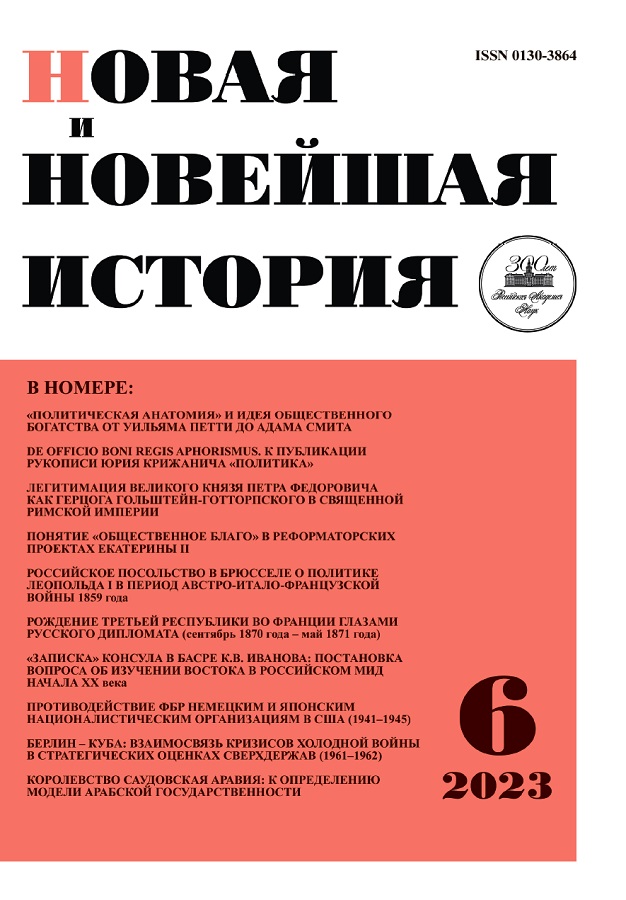The Chilean Revolution and the USSR: Salvador Allende Viewing from the Offices of the CPSU Central Committee
- Авторлар: Schelchkov A.A.1
-
Мекемелер:
- Institute of World History, RAS
- Шығарылым: № 6 (2023)
- Беттер: 151-164
- Бөлім: 20th century
- URL: https://snv63.ru/0130-3864/article/view/670908
- DOI: https://doi.org/10.31857/S013038640028928-8
- ID: 670908
Дәйексөз келтіру
Аннотация
The Chilean Revolution, which began with the rise to power of Salvador Allende in 1970 and dramatically ended with a military coup d'état and the death of the Chilean President on 11 September 1973, is one of the most significant events of Latin American history in the twentieth century, This revolution had an enormous international resonance, particularly on the political left, arousing wariness in the countries of genuine socialism, above all in the USSR, and hope among the European left, which believed in the success of the cause of socialism under conditions of freedom, democracy, and political pluralism. The person of Allende embodied the principles of the “Chilean way to socialism”, loyalty to democracy and freedom. President Allende was at the centre of attention of all world powers, including the USSR, which watched the socialist experiment in the most distant country in Latin America with keen interest. For Moscow, the ideas, political practice and personal characteristics of the Chilean leader were of great importance in determining both state and party-political policy towards the Chilean experiment. This point of view was not voiced publicly, but had a significant influence on decision-making in Moscow. In this study, the author seeks to reveal the evolution of the attitudes towards Salvador Allende on the part of the Soviet party-state apparatus, drawing on documents of the CPSU Central Committee.
Негізгі сөздер
Әдебиет тізімі
- Белят М.Ю. Сальвадор Альендею М., 1988.
- Лаврецкий И. Сальвадор Альенде. М., 1975.
- Уроки Чили. М., 1977.
- Щелчков А.А. Маоизм в Чили в 60-е годы. Раскол в Международном коммунистическом движении и чилийские левые // Латиноамериканский исторический альманах. 2022. № 36. С. 255–278.
- Allende S. Obras escogidas. Santiago de Chile, 1992.
- Brega J. ¿Ha muerto el comunismo? El maoísmo en la Argentina. Conversaciones con Otto Vargas, Buenos Aires, 1990.
- Casals M. El alba de una revolución, La izquierda y la construcción estratégica de la “vía chilena al socialismo”. 1956–1970. Santiago, 2010.
- Chile en los archivos soviéticos. T. 4. Anos 60 / compil. O. Ulianova. Santiago, 2020.
- Corvalán L. El gobierno de Salvador Allende. Santiago, 2003.
- Debray R. Conversación con Allende. México, 1971.
- Ferrero M. Salvador Allende: su mundo, su época. La política internacional del siglo XX y sus encrucijadas en la Guerra Fría // Salvador Allende: vida política y parlamentaria 1908–1973. Santiago de Chile, 2008. P. 203–246.
- Garrido González P. Clasistas, antiimperialistas y revolucionarios. Trayectoria política e intelectual del socialismo chileno contemporáneo. 1932–1973. Santiago, 2021.
- Núñez R. El gran desencuentro. Una mirada al socialismo chileno, la Unidad Popular y Salvador Allende. Santiago de Chile, 2017.
- Pedemonte R. Guerra por las ideas en América Latina, 1959–1973. Presencia soviética en Cuba y Chile. Santiago, 2020.
- Pozo J. Rebeldes, reformistas y revolucionarios. Santiago, 1992.
- Puccio O. Un cuarto de siglo con Allende: recuerdos de su secretario privado. Santiago, 1985.
- Salvador Allende: pensamiento y acción / coord. F. Modak. Buenos Aires, 2008.
- Serani Pradenas E. Salvador Allende Gossens: una biografía política // Salvador Allende: vida política y parlamentaria 1908–1973. Santiago de Chile, 2008. P. 15–52.
- Ulianova O. La Unidad Popular y el golpe militar en Chile: percepciones y análisis soviéticos // Estudios Públicos. 2000. № 79. P. 1–89.
- Veneros D. Allende. Un ensayo psicobiográfico. Santiago, 2003.
- Winn P. La revolución chilena. Santiago, 2013.
Қосымша файлдар









